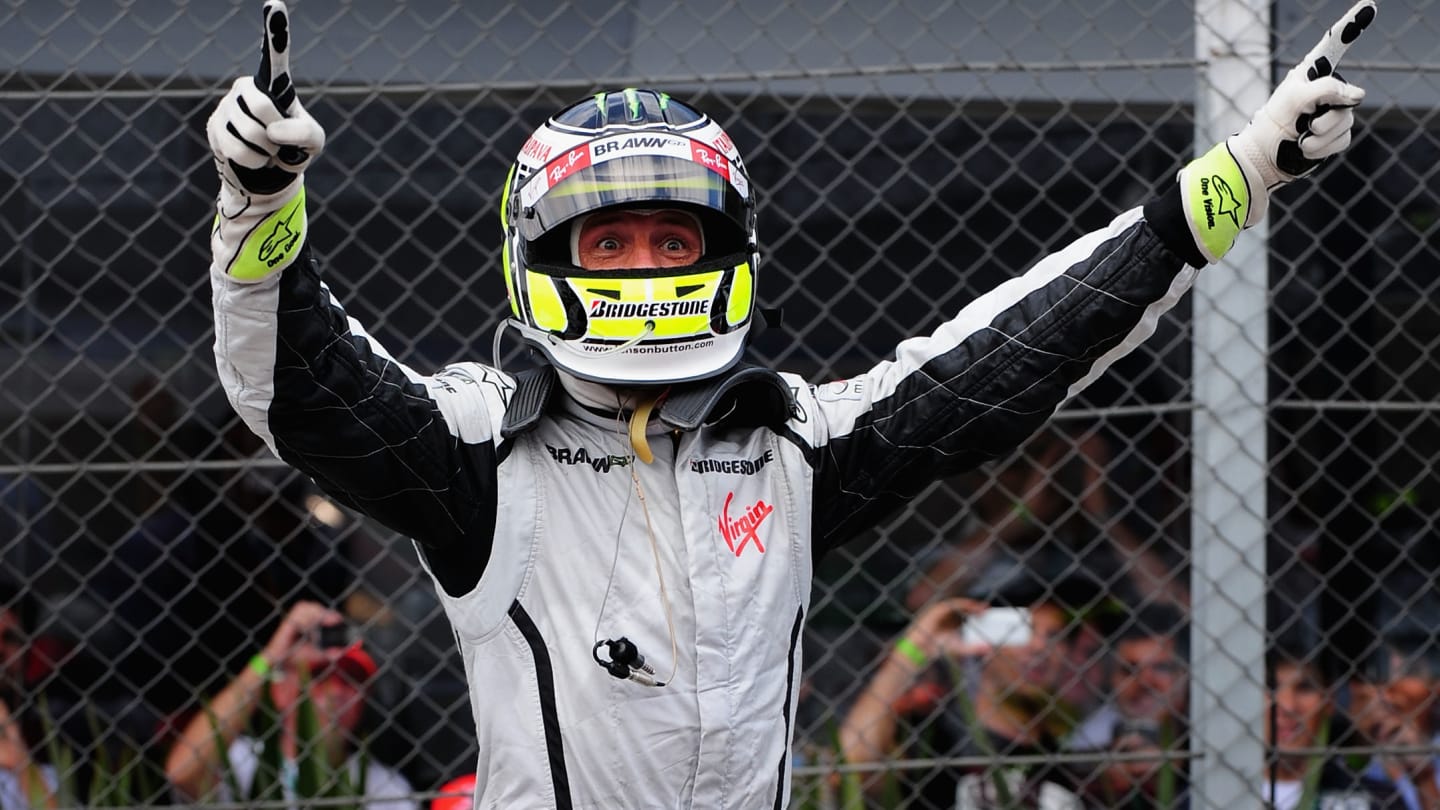
HALL OF FAME - 2009
Jenson Button

The 2009 World Champion grew up in the sport, maturing from a carefree youngster distracted by having too much too soon into a seasoned survivor who toiled in obscurity for a decade before his perseverance suddenly paid off in a fairy tale finish with a team that came from nowhere. His unexpected title triumph was partly the product of circumstances that prevented other contenders from overcoming his sensational head start, but ultimately it was Jenson Button's talent and tenacity that took him to the top...
When their son was born, on 19 January, 1980, in Frome, Somerset, southwest England, John and Simone Button named him after Erling Jensen, a Danish friend who competed in rallycross, a branch of motorsport in which John Button had raced with distinction. While the spelling of his name was deliberately changed to differentiate it from the Jensen sportscar, Jenson Button was from infancy fascinated by motorsport. A hyperactive, strong-willed child with a short attention span, he only sat still when watching racing on TV. A miniature scramble bike, a gift for his seventh birthday, briefly satisfied his appetite for action until it was replaced in his affections by a 60cc go-kart, a Christmas present the eight-year-old drove to victory in his very first race. The little blond, freckle-faced winner went to sleep hugging his tiny trophy, having informed his indulgent Dad that he wanted to be Formula 1 World Champion.
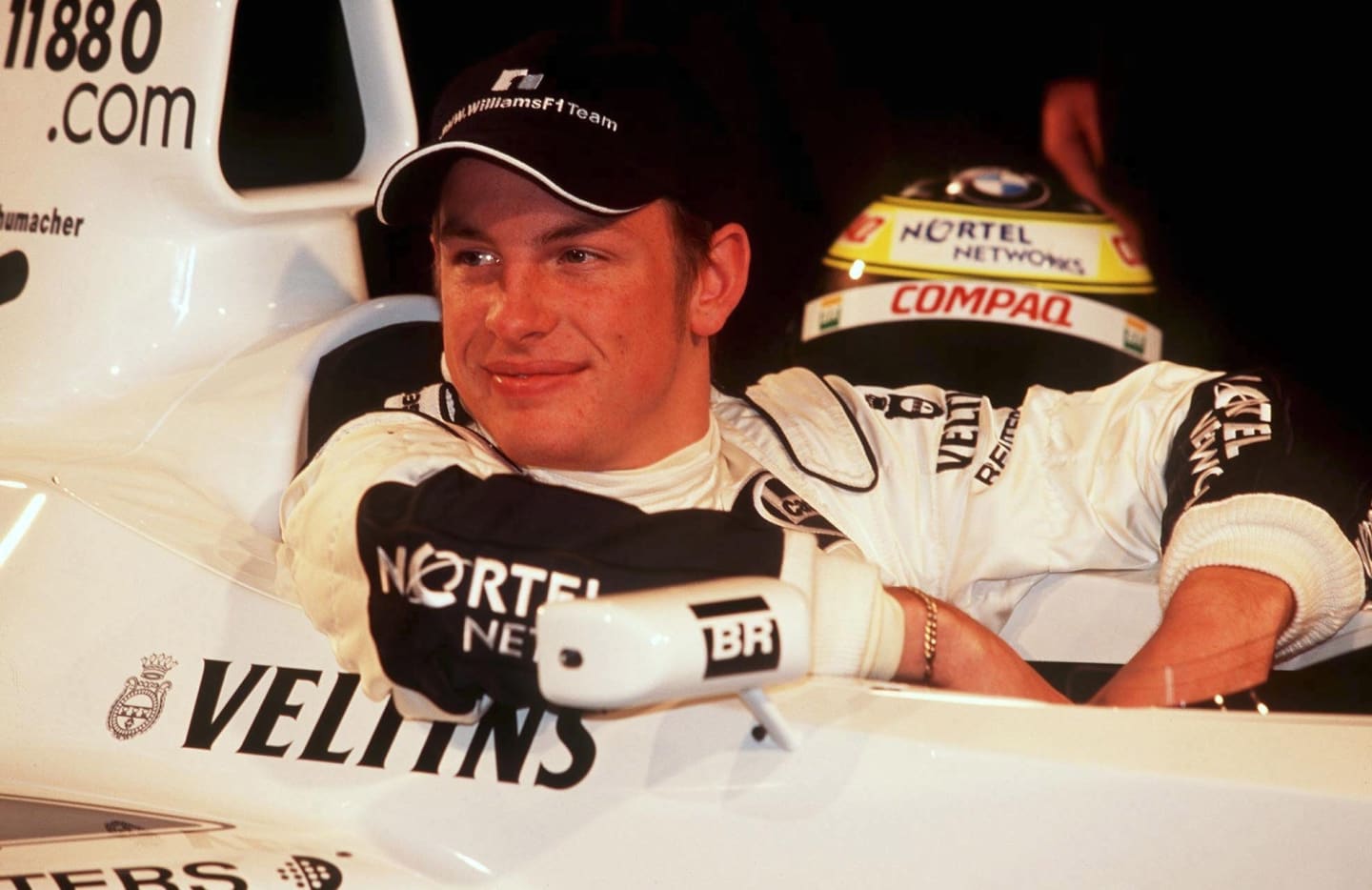
Button ahead of his debut Formula 1 season in 2000 with Williams
By this time his parents had separated and Jenson moved in with his father, who would support him throughout his career, while remaining close to his mother and his three older sisters, Natasha, Samantha and Tanya. Easy-going and always smiling, the affable youngster was popular with his friends and schoolmates, few of whom were aware of how the modest and unassuming Jenson Button was becoming a big name in the karting world.
John Button coached his son and helped pay for his racing with the proceeds from a kart engine preparation business. Among his customers was Anthony Hamilton, whose son Lewis would become the 2008 World Champion. Though money was always short for the Buttons (on one occasion John had to borrow funds to buy fuel to drive home from a race in Scotland) their kart adventures became increasingly serious. As an 11-year-old Jenson won all 34 races in the British Cadet category, following which a succession of British kart titles led to a contract with a professional Italian-based team. His weekend hobby had become a career (he left school in his mid-teens) and at 17 Jenson became the youngest driver to win the European Formula Super A championship.
While talent watchers were now comparing him to the late world champion Ayrton Senna, Jenson failed his first attempt to get a licence to drive a road car because he frightened his examiner by speeding through a narrow gap in traffic. Yet this same swift, smooth and assured technique won him the 1998 British Formula Ford championship and a year later he was immediately quick and confident in testing one of multiple world champion Alain Prost's F1 cars. Jenson at first thought it was a joke when his Christmas eve celebrations with friends in a Frome pub were interrupted by a phone call from Frank Williams. The reality, an invitation to test a Williams F1 car, was in fact a shoot-out with another driver to fill a vacancy. Five days after his 20th birthday, moments before the launch of the 2000 edition of the Williams-BMW F1 team, Frank Williams told him he had the job, whereupon Jenson and John Button burst into tears.
His debut F1 season went well (he became the sport's youngest ever point scorer) but Williams (having previously committed to another driver) loaned Jenson to Benetton-Renault for the next two seasons. During this period his on-track performances were less noteworthy than the dramatic lifestyle changes he so eagerly embraced. Yet the series of glamourous girlfriends, the Monaco flat, the Ferrari road car, the 72 foot yacht, were expensive distractions that, as Jenson later admitted, nearly cost him his career. When releasing him (to make way for future champion Fernando Alonso) Benetton boss Flavio Briatore declared that "Jenson Button is just a lazy playboy."
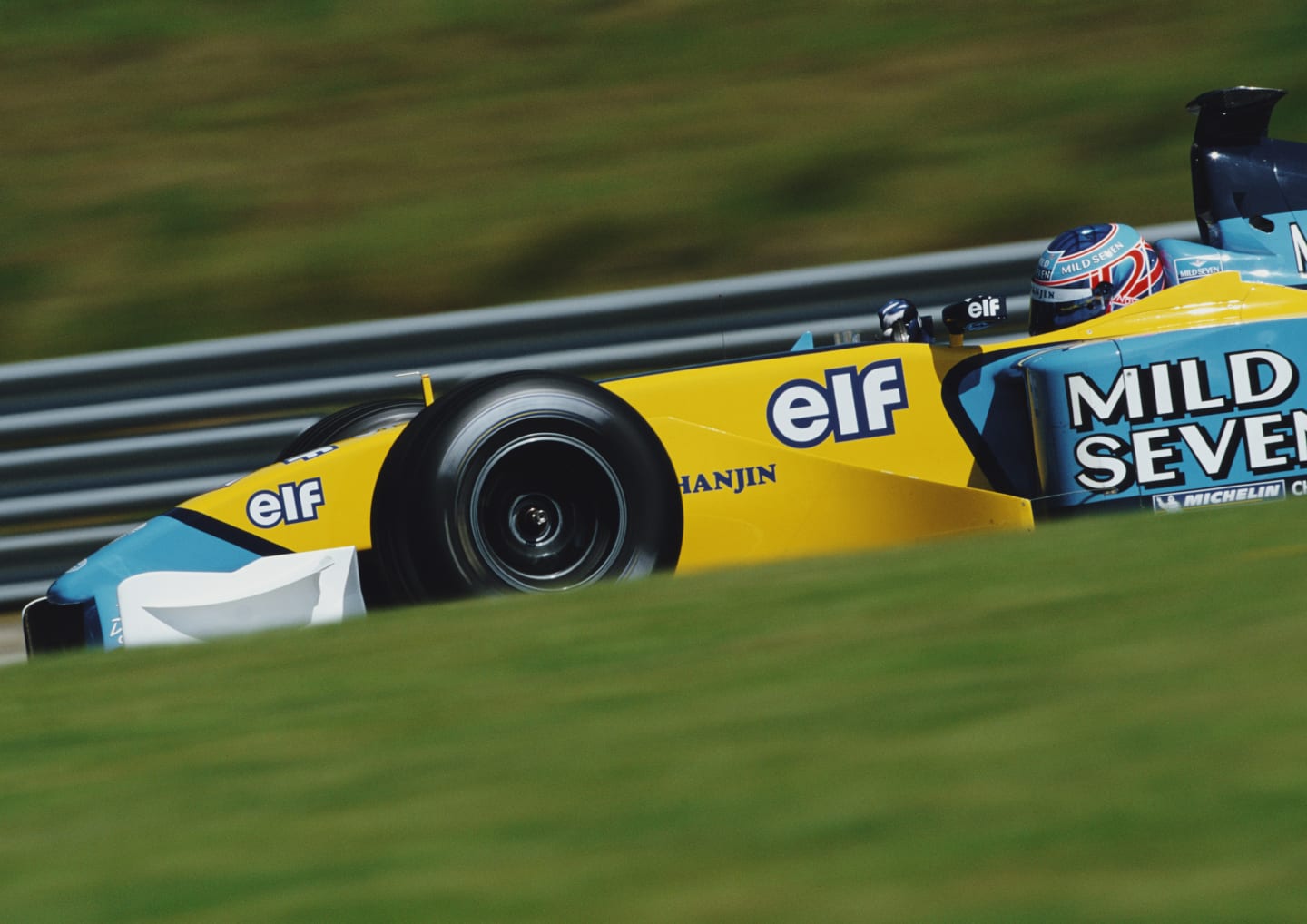
Button at the wheel of the Renault RS22 during the 2002 Austrian Grand Prix
In 2003 he was rescued from the scrapheap by BAR-Honda, where he was teamed with Jacques Villeneuve. The 1997 champion gave him a hostile reception, claiming he looked more like "a cute and smiley boyband member" than a racer. But it was Villeneuve who lost face when he was outperformed by Button, who went on to finish a brilliant third overall in the 2004 championship. Then he astonished everyone by signing a contract to return to Williams. In the ensuing dispute for his services the Contract Recognition Board ruled he must stay at BAR-Honda in 2005, after which a move to Williams might take place. But the subject of the 'Buttongate' controversy changed his mind and when Honda bought out BAR in 2006 Jenson bought out his Williams contract.
His reputation as a 'winless wonder' ended with a somewhat fortuitous first victory in the 2006 Hungarian Grand Prix. Ineffective cars in the next two seasons kept him far away from the forefront and prompted Honda to make a shock withdrawal from the sport late in 2008. Then came the miraculous resurrection that began just three weeks before the first race of the new season with a management takeover led by team principal Ross Brawn, whose credentials included masterminding Michael Schumacher's seven world championships with Renault and Ferrari. Still, nobody imagined a back-from-the-brink Brawn GP team would be title contenders in 2009.
Against all the odds and expectations, including their own, the Brawn-Mercedes driven superbly by Jenson Button won six of the first seven races. He didn't win again, becoming more tentative under the unfamiliar pressure of having to preserve his championship lead that came under increasing threat as other teams overcame Brawn's initial technical advantage. Nonetheless, Jenson steadily accumulated more than enough points to lead the standings all season long, clinching the driving title and helping secure the Constructors' Championship for Brawn with a breathtakingly assertive performance in the penultimate race of the season.
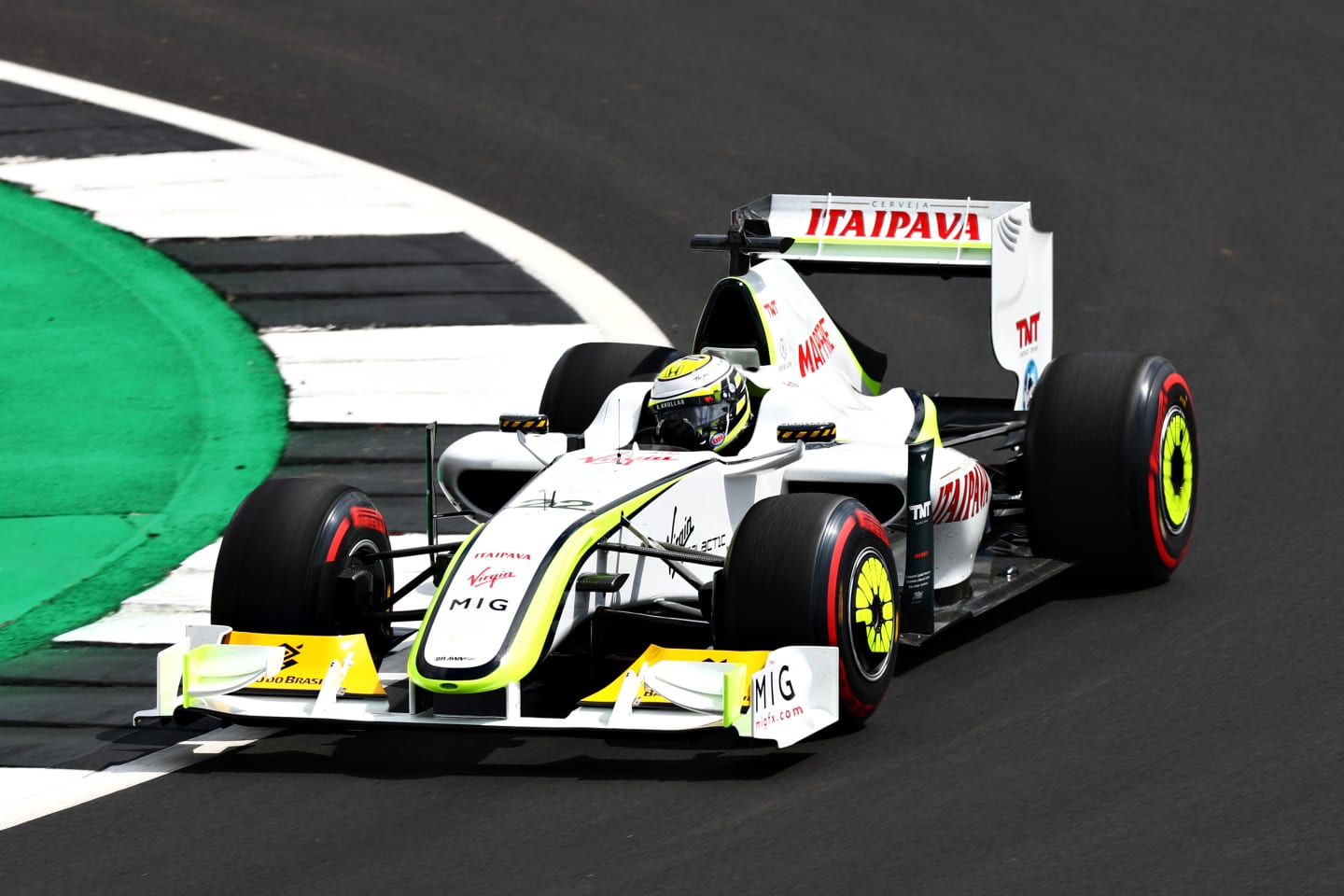
Button in the Brawn BGP 001 on track ahead of the 2019 British Grand Prix at Silverstone
In 2003 he was rescued from the scrapheap by BAR-Honda, where he was teamed with Jacques Villeneuve. The 1997 champion gave him a hostile reception, claiming he looked more like "a cute and smiley boyband member" than a racer. But it was Villeneuve who lost face when he was outperformed by Button, who went on to finish a brilliant third overall in the 2004 championship. Then he astonished everyone by signing a contract to return to Williams. In the ensuing dispute for his services the Contract Recognition Board ruled he must stay at BAR-Honda in 2005, after which a move to Williams might take place. But the subject of the 'Buttongate' controversy changed his mind and when Honda bought out BAR in 2006 Jenson bought out his Williams contract.
His reputation as a 'winless wonder' ended with a somewhat fortuitous first victory in the 2006 Hungarian Grand Prix. Ineffective cars in the next two seasons kept him far away from the forefront and prompted Honda to make a shock withdrawal from the sport late in 2008. Then came the miraculous resurrection that began just three weeks before the first race of the new season with a management takeover led by team principal Ross Brawn, whose credentials included masterminding Michael Schumacher's seven world championships with Renault and Ferrari. Still, nobody imagined a back-from-the-brink Brawn GP team would be title contenders in 2009.
Against all the odds and expectations, including their own, the Brawn-Mercedes driven superbly by Jenson Button won six of the first seven races. He didn't win again, becoming more tentative under the unfamiliar pressure of having to preserve his championship lead that came under increasing threat as other teams overcame Brawn's initial technical advantage. Nonetheless, Jenson steadily accumulated more than enough points to lead the standings all season long, clinching the driving title and helping secure the Constructors' Championship for Brawn with a breathtakingly assertive performance in the penultimate race of the season.
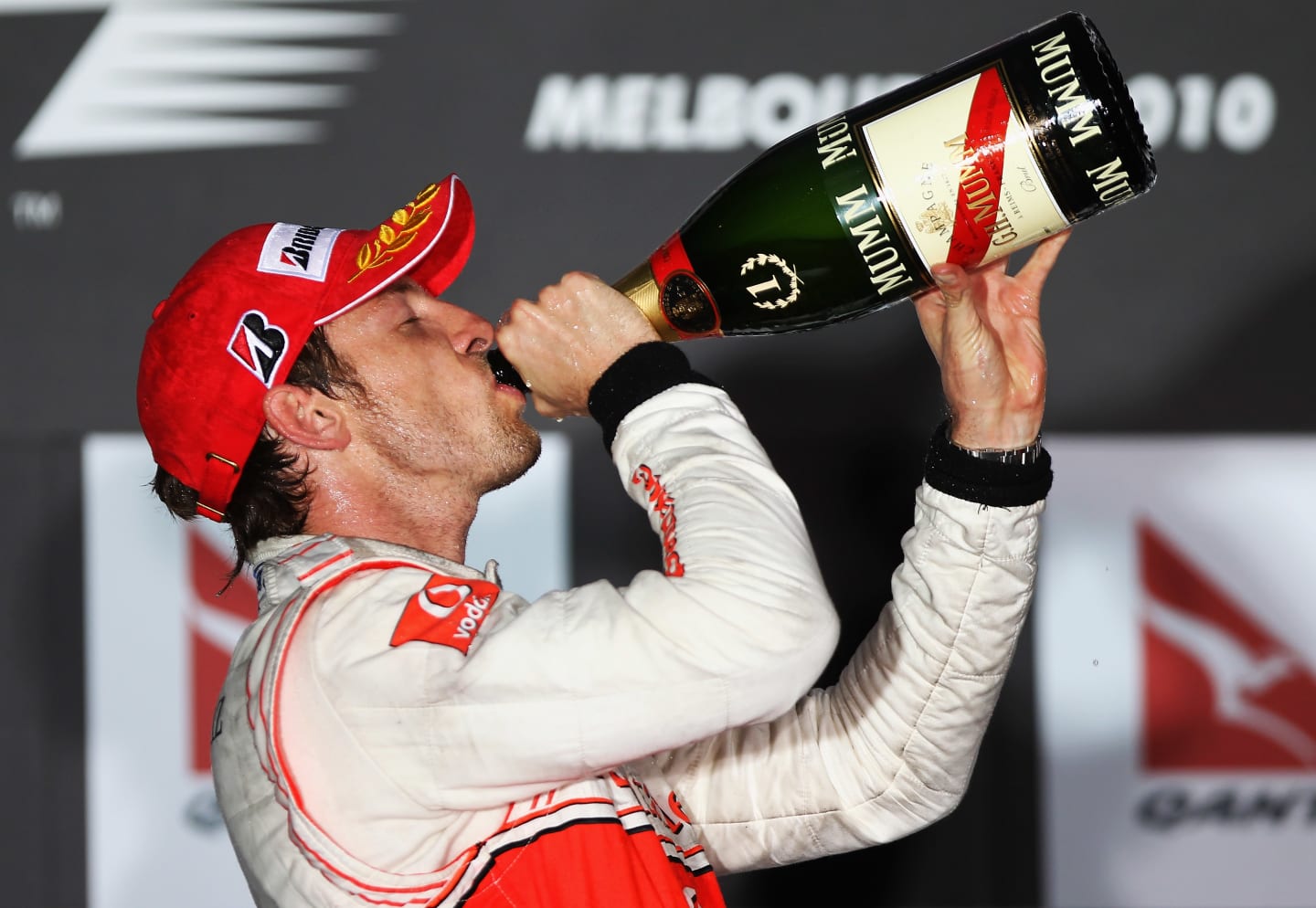
Button celebrates on the podium after winning the 2010 Australian Grand Prix for McLaren
“This team has shown many strengths in adversity,” was Jenson Button’s response to McLaren and Honda’s failure to provide him with a competitive car in 2015. Unlike his oft disgruntled team mate Fernando Alonso, Button’s enduring optimism (in spite of a points total that restricted him to 16th place in the drivers’ standings) represented a unifying force for a team in disarray. His future with McLaren, which was only confirmed late in season, was a tribute to the veteran’s value as a loyal team player who could help speed up a recovery.
“We arrive in Formula 1 with dreams and leave with memories”. So said 36-year-old Jenson Button on leaving the sport after 17 memorable seasons. “It’s been a rollercoaster ride through the years, full of ups and downs”, was how the ever-smiling, perennially popular driver summed up his career.
Officially, the veteran campaigner was only taking a sabbatical in 2017, while remaining as McLaren’s reserve driver with the option to race again in 2018. Though the he said he hoped to race until he was 70, it seemed likely the 21-race 2016 season was a farewell tour for Jenson Button, the 2009 champion whose record stood at 15 wins and 50 podiums in 305 Grands Prix.
In the end he raced just once more for McLaren-Honda in 2017, (deputizing for Fernando Alonso), at Monaco, where he failed to finish after colliding with another car. This occasion also marked the finish of his F1 career. At the end of the year he signed a contract to race for Honda in the 2018 Japanese Super GT series.
Text - Gerald Donaldson